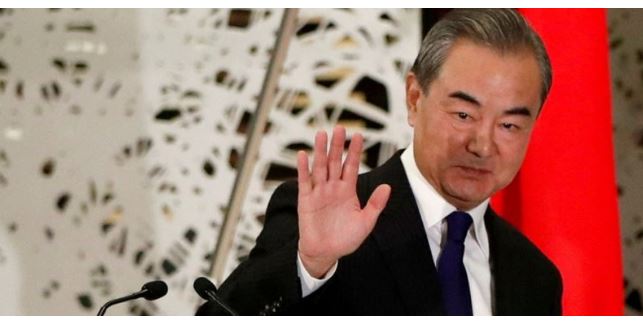China would not fear confrontation with the United States but would welcome cooperation if it is mutually beneficial, Chinese Foreign Minister Wang Yi said on Monday.
Problems in the U.S.-China relationship were down to “strategic misjudgments” by the American side, he said in a speech, posted on foreign ministry website.
“If there is confrontation, then (China) will not fear it, and will fight to the finish,” he said.
Wang said “there is no harm” in competition but it should be “positive”.
Relations between the United States and China are at a low over a range of disagreements including the origins of the COVID-19 pandemic, trade, human rights, and Beijing’s increasing pressure on Taiwan.
In a call last month that lasted for more than three hours, U.S. President Joe Biden pressed his counterpart, Xi Jinping, on human rights while Xi warned that China would respond to what it called provocation on Taiwan.
The U.S. Senate passed legislation on Thursday to ban imports from China’s Xinjiang region over concern about forced labour, the latest U.S. response to Beijing’s treatment of the Uyghur Muslim minority there.
China rejects accusations of rights abuses in Xinjiang.
REUNIFICATION WITH “WANDERER” TAIWAN
Taiwan is not a chess piece to be used by others, Beijing’s top diplomat said on Monday, emphasizing the need for China to be reunified with the island territory it claims as a “breakaway province.”
“Taiwan is a wanderer who will eventually go home, not a chess piece that is used by others. China must be unified,” Wang Yi, China’s state counsellor and foreign minister, told an international symposium on Chinese diplomacy in Beijing.
“There is a new round of tension in the Taiwan Strait. The crux of the problem is that the Taiwan authorities are trying to rely on the United States for independence and the United States and individual countries intend to use Taiwan to control China.”
He said the “connotation of the One China principle is in danger of being falsified or even hollowed out,” according to a statement released by the Chinese Foreign Ministry.
“It is these perverse acts that have changed the status quo across the Taiwan Strait, undermined the peace and stability of the Taiwan Strait, and violated the consensus of the international community and the basic norms of international relations,” said Wang.
Tensions have spiked this year in the Taiwan Strait, which separates mainland China from Taiwan, amid increased interaction between Taipei and the US and its allies.
Beijing has sent a record number of warplanes across the strait as part of moves to thwart challenges to its sovereignty.
“We issued a solemn warning and carried out a vigorous countermeasure, which shocked the arrogance of the ‘Taiwan independence‘ separatist forces,” Wang said.
“We will resolutely fight against any threats and challenges that endanger China’s sovereignty, security and development interests; we will resolutely fight back against any malicious acts that interfere in our internal affairs and wantonly spread rumors and smear.”
On China’s resumption of diplomatic relations with Nicaragua, he said Beijing now has diplomatic ties with 181 countries across the globe.
TAIWAN’S RESPONSE
Taiwan’s China-policymaking Mainland Affairs Council said in response that the island had never been a part of the People’s Republic of China.
“It is neither a wanderer nor a chess piece,” it said in a statement sent to Reuters.
“Only the 23 million people of Taiwan have the right to decide Taiwan’s future, and absolutely will not accept a path laid out by an autocratic political system.”
China has been particularly angered by support for Taiwan from the United States, the island’s most important international backer and arms supplier despite the absence of formal diplomatic ties.
Taiwan’s government has repeatedly denounced China’s pressure, saying that they will not give in to threats.
The defeated Republic of China government fled to Taiwan in 1949 after losing a civil war with the Communists, who established the People’s Republic of China.

















